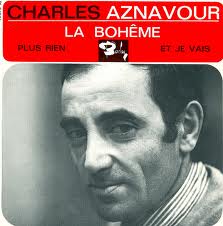“La Bohème” is a classic of what is known as la chanson française: songs in French, usually containing poetic, social, or intellectual lyrics. It is famous not only in France but also abroad, and has been translated into many different languages. It was written by the prolific French songwriter Jacques Plante along with Charles Aznavour, a French composer and singer of Armenian origin who is also one of France’s most respected musical artists. First recorded in 1965, the song was originally meant to be sung by popular singer Georges Guétary in the opérette Monsieur Carnaval. However, Aznavour recorded it on his own before the show launched, leading to quarrels between the artists and their recording companies. Nevertheless, good sales for both helped soothe the situation.
"“La Bohème” is a classic of what is known as la chanson française: songs in French, usually containing poetic, social, or intellectual lyrics"
The song evokes the bohemian and artistic way of life, based on poverty and freedom, as celebrated by Arthur Rimbaud in his famous poem “Ma Bohème.” It is also a tribute to the golden age of the popular Parisian neighborhood of Montmartre, which during the 19th and early 20th centuries was the center of an artistic revolution that would change painting forever. From the impressionists to Picasso, the greatest artists of the time lived on the hills of Montmartre, which was officially integrated into Paris in 1860.

The narrator of the lyrics is himself a painter and recalls his youth in Montmartre, “un temps que les moins de vingt ans ne peuvent pas connaître” (a time those younger than twenty years cannot have known). These were times of financial misery and starvation (“moi qui criait famine”) as well as happiness (“la bohème, ça voulait dire on est heureux”) and love with models (“toi qui posais nue,” meaning “those of you who posed nude”).
"The song is imbued with bittersweet nostalgia, both in its delicate melody and lyrics, particularly the last lines, in which the painter sadly remarks that nothing is left of his former atelier and of Montmartre as he used to know it"
The song is imbued with bittersweet nostalgia, both in its delicate melody and lyrics, particularly the last lines, in which the painter sadly remarks that nothing is left of his former atelier and of Montmartre as he used to know it. The lilacs that used to flourish there are now all dead. As the narrator concludes, “la bohême, ça ne veut plus rien dire du tout” (la bohème, that doesn’t mean anything anymore).
Lyrics:
Je vous parle d'un temps. Que les moins de vingt ans. Ne peuvent pas connaître Montmartre en ce temps-là Accrochait ses lilas. Jusque sous nos fenêtres. Et si l'humble garni. Qui nous servait de nid. Ne payait pas de mine. C’est là qu'on s'est connu Moi qui criais famine. Et toi qui posais nue. La bohême, la bohême. Ça voulait dire. On est heureux. La bohême, la bohême. Nous ne mangions qu'un jour sur deux. Dans les cafés voisins. Nous étions quelques-uns. Qui attendions la gloire. Et bien que miséreux. Avec le ventre creux. Nous ne cessions d'y croire. Et quand quelques bistrots. Contre un bon repas chaud. Nous prenaient une toile. Nous récitions des vers. Groupés autour du poêle. En oubliant l'hiver. La bohême, la bohême. Ça voulait dire. Tu es jolie. La bohême, la bohême. Et nous avions tous du génie. Souvent il m'arrivait Devant mon chevalet. De passer des nuits blanches. Retouchant le dessin. De la ligne d'un sein. Du galbe d'une hanche. Et ce n'est qu'au matin. Qu'on s'asseyait enfin. Devant un cafté crème. Épuisés mais ravis. Fallait-il que l'on s'aime. Et qu'on aime la vie. La bohême, la bohême. Ça voulait dire. On a vingt ans. La bohême, la bohême. Et nous vivions de l'air du temps. Quand au hasard des jours Je m'en vais faire un tour. A mon ancienne adresse. Je ne reconnais plus. Ni les murs ni les rues. Qui ont vu ma jeunesse. En haut d'un escalier. Je cherche l'atelier. Dont plus rien ne subsiste. Dans son nouveau décor. Montmartre semble triste. Et les lilas sont morts. La bohême, la bohême. On était jeunes. On était fous. La bohême, la bohême. Ça ne veut plus rien dire du tout.



